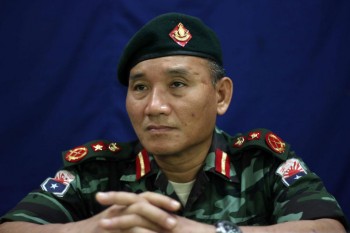Karen Army General Explains Rational Behind Reformation Of Ethnic Alliance And Recent Conflict With Govt Troops

For the sake of clarity, Karen News has provided General Baw Kyaw Heh’s answers in full.
Q: Who will lead the KAF?
A: The reunion of KAF is only the first of many steps in a process to reform the Karen security sector. Details of the structure and authority/leadership will be announced later. At this stage, KAF means a collaboration, coordination and reunion of different Karen armed forces. Each unit and command will be led by its current commander as usual.
Q: Why is there need for a KAF, Why not just one-armed force that already exists, like the KNLA?
A: In fact, KAF has already existed since the late 1940s. Soon after the Karen resistance started in 1949, Kawthoolei Arm Forces was formed in order to reorganize all Karen armed forces such as KNDO, Karen Rifle, UMP and police force etc. In this current political context, we found that KAF is the best neutral platform to bring together the different armed forces to cooperate and seek out the best solutions to support Karen national political aspirations, including how to best fit into the changing political landscape. The first step is the reunion and then the reform will follow.
Q: Is every part of each different group joining the KAF? Will the KAF represent 100% membership of each armed group?
A: As everyone can see, none of the different groups is monolithic, and this is due to internal and external political factors and geographical locations. This is the reason why we need KAF as an umbrella institution that they can turn to in times of military and/or political crisis. In the current extreme political climate, it is really challenging for the different armed group leaders to bring all groups on board in a short time. However, the joint agreement that we have initiated now represents an initial success in bringing some armed groups that have split from the KNU over the last two decades to reunite. The reunion can eventually lead us to better understanding and cooperation, and thus a true representation of all the members under the umbrella of KAF will emerge.
Q: What are your thoughts on the latest fighting in Karen State?
A: We are engaging in the peace process, and we are serious about it. However, we reserve our right to defend ourselves, as we have not solved any of the political problems yet. Militarily, the Burma Army knows that the Karen armed groups are trying to reunite under the leadership of KNU. When one of the armed groups is attacked and the other groups fail to respond and assist, it means the BA can divide and rule the armed groups like they always do. The recent BA attacks on the DKBA illustrates this. Politically, the government uses carrot-and-stick tactics in its strategy to get the armed groups to agree to its nationwide ceasefire terms. Economically, it is extremely important for the government and the Burmese army to gain 100% control over the Myawaddy-Hpa-An region in order to realize full economic integration in the ASEAN Economic Community (AEC) by 2015. The region is the only broken link in the east-west economic corridor, thus frustrating the economic dreams, not only of the Burmese government, but those of ASEAN as well. Other mega development projects such as the Asia Highway, SEZ and hydropower dams are on the horizon. The government always pushes to “accelerate development projects in tandem with peace” in conflict areas. Dividing, fighting, and crushing ethnic armed groups is the Burmese army’s shortcut on the road to peace and development.
Q: What will be the political organization representing the KAF?
A: All armed groups recognize the political leadership of the KNU, as well as its political goals. So, it is really important for the KNU to do more to truly represent the interests of all armed groups politically. This will be a work in progress because we must acknowledge that there are differences among and within the different groups. KNU, KNLA/PC, and DKBA have all signed separate ceasefire agreements with the government, so they each represent their own organization.

No comments:
Post a Comment